英语小课题立项申请书模板
英语学习活动观课题立项申请书

英语学习活动观课题立项申请书Dear committee members,I am writing to submit a proposal for an English learning activity observation project. As an English teacher, I have observed a growing need for innovative and effective teaching methods to engage students in the learning process. This project aims to observe and analyze various English learning activities to identify best practices and areas for improvement.First and foremost, the goal of this project is to observe a wide range of English learning activities in different educational settings, such as primary schools, secondary schools, and language institutes. By doing so, we hope to gain a comprehensive understanding of the current practices and challenges in English language education. Through these observations, we aim to identify effective teaching strategies, classroom management techniques, and student engagement methods that can be applied in variouslearning environments.In addition, this project will focus on the role of technology in English language learning. With the advancement of technology, there are now numerous digital tools and resources available for language education. We plan to observe how these tools are integrated into English learning activities and their impact on student learning outcomes. By examining the use of technology in English classrooms, we hope to gain insights into the mosteffective ways to leverage digital resources for language education.Furthermore, we are interested in exploring the impact of cultural diversity on English language learning. As English is a global language, it is crucial to consider the cultural backgrounds and experiences of students in the learning process. We will observe how cultural diversity is addressed in English learning activities and how it affects student participation and understanding. By doing so, we aim to identify inclusive teaching practices that can accommodate diverse cultural perspectives and enhance thelearning experience for all students.Moreover, this project will also examine the effectiveness of collaborative learning in English language education. Collaborative learning has been shown to foster critical thinking, communication skills, and intercultural competence. We plan to observe how collaborative learningis implemented in English classrooms and its impact on student engagement and language acquisition. Through these observations, we aim to identify best practices for promoting collaborative learning in English language education.In conclusion, this project seeks to provide valuable insights into the current practices and challenges in English language education. By observing a wide range of English learning activities, we aim to identify effective teaching strategies, the role of technology, cultural diversity, and collaborative learning in language education. We believe that the findings from this project will contribute to the improvement of English language teaching and learning practices. Thank you for considering ourproposal, and we look forward to the opportunity to conduct this observation project.。
英语课题立项申请书范文

英语课题立项申请书范文Proposal for English Curriculum Development Project.1. Project Overview.Project Title: Enhancing English Language Skills Through Immersive Learning Experiences.Project Duration: One academic year (two semesters)。
Target Group: Secondary school students aged 13-16。
Project Aims:1. To improve students' English language proficiency through practical and immersive learning experiences.2. To enhance students' cultural understanding and intercultural communication skills.3. To foster a positive attitude towards language learning and global engagement.2. Project Background.In today's interconnected world, proficiency in English has become a crucial skill for personal and professional success. However, traditional teaching methods often fail to engage students, resulting in a disconnect between learning and real-world applications. This project aims to bridge this gap by incorporating immersive learning experiences into the English curriculum.3. Project Objectives.To design and implement an immersive learning program that integrates English language learning with real-world contexts.To create a curriculum that encourages active participation and collaboration among students.To evaluate the effectiveness of the program through regular assessments and feedback mechanisms.4. Methodology.Curriculum Design:+ Incorporate themes such as global issues, cross-cultural communication, and technology into lesson plans.+ Develop interactive activities and role-plays to simulate real-world scenarios.+ Utilize multimedia resources and technology tools to enhance learning.Immersive Learning Experiences:+ Arrange visits to local businesses and organizations to provide practical language use opportunities.+ Collaborate with other schools or educational institutions to create an international student exchange program.+ Encourage participation in language-related competitions and workshops.Assessment and Feedback:+ Regularly assess students' progress through written assignments, oral presentations, and group projects.+ Collect feedback from students, teachers, and parents to improve the program.5. Expected Outcomes.Significant improvement in students' English proficiency levels.Enhanced cultural awareness and intercultural communication skills.Increased motivation and engagement in language learning.Development of a positive attitude towards global engagement and cross-cultural understanding.6. Resources Required.Funding for program implementation and materials.Access to local businesses and organizations for immersion experiences.Technology tools and multimedia resources for enhanced learning.Collaboration with other schools or educational institutions for exchange programs.7. Implementation Plan.Phase 1 (Month 1-2): Curriculum design and planning.Phase 2 (Month 3-6): Implementation of the immersive learning program.Phase 3 (Month 7-8): Mid-term assessment and feedback collection.Phase 4 (Month 9-12): Continuation of the program with adjustments based on feedback.Phase 5 (End of Year): Final assessment and evaluation of the program's effectiveness.8. Conclusion.By implementing this English curriculum development project, we aim to transform traditional language learning into an engaging and meaningful experience for students. Through immersive learning opportunities, students will not only improve their English proficiency but also gain valuable cross-cultural insights and global perspectives.We believe that this approach will foster a generation of young learners who are not only proficient in English but also passionate about global engagement and cultural exchange.。
英语教育立项申请书模板
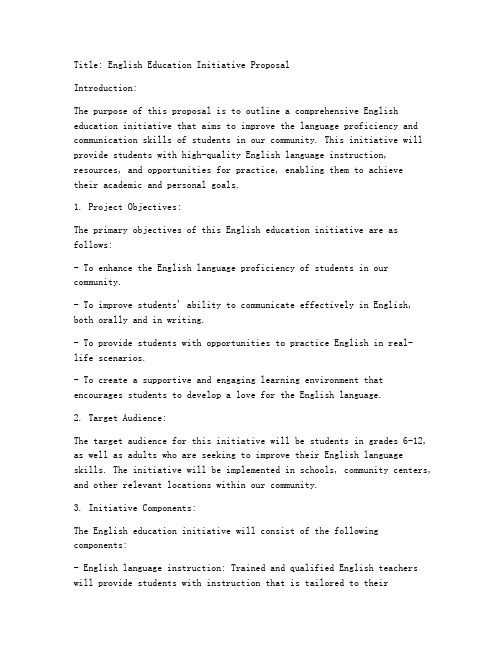
Title: English Education Initiative ProposalIntroduction:The purpose of this proposal is to outline a comprehensive English education initiative that aims to improve the language proficiency and communication skills of students in our community. This initiative will provide students with high-quality English language instruction, resources, and opportunities for practice, enabling them to achievetheir academic and personal goals.1. Project Objectives:The primary objectives of this English education initiative are as follows:- To enhance the English language proficiency of students in our community.- To improve students' ability to communicate effectively in English, both orally and in writing.- To provide students with opportunities to practice English in real-life scenarios.- To create a supportive and engaging learning environment that encourages students to develop a love for the English language.2. Target Audience:The target audience for this initiative will be students in grades 6-12, as well as adults who are seeking to improve their English language skills. The initiative will be implemented in schools, community centers, and other relevant locations within our community.3. Initiative Components:The English education initiative will consist of the following components:- English language instruction: Trained and qualified English teachers will provide students with instruction that is tailored to theirindividual needs and learning styles. The curriculum will cover all aspects of language learning, including grammar, vocabulary, pronunciation, listening, speaking, reading, and writing.- Resources and materials: Students will have access to a wide range of resources and materials, including textbooks, workbooks, online resources, and multimedia materials. These resources will be used to support and enhance the instruction provided by teachers.- Opportunities for practice: Students will have the opportunity to practice their English language skills in real-life scenarios, such as through participation in English clubs, speaking competitions, and community service projects.- Parent and community involvement: Parents and community members will be encouraged to participate in English language learning activities, such as parent workshops and community events, to support and encourage their children's learning.4. Implementation Plan:The English education initiative will be implemented over a period of two years. The following steps will be taken to ensure successful implementation:- Conduct a needs assessment to identify the specific English language needs and goals of the target audience.- Train and hire qualified English teachers who have experience in teaching English as a second language.- Develop a comprehensive curriculum that meets the needs of students at various levels of proficiency.- Provide students with access to a wide range of resources and materials to support their learning.- Organize regular English language learning activities, such as English clubs, speaking competitions, and community service projects.- Monitor and evaluate the progress of students and make necessary adjustments to the initiative as needed.5. Expected Outcomes:The English education initiative is expected to achieve the following outcomes:- Improved English language proficiency and communication skills among students in our community.- Increased confidence and motivation among students to continue learning English.- Enhanced parent and community involvement in English language learning activities.- A more inclusive and diverse community that values and appreciates the English language.6. Budget:The estimated budget for the two-year implementation of the English education initiative is as follows:- Teacher salaries and training: $40,000- Curriculum development and resources: $20,000- Student materials and resources: $10,000- Program evaluation and assessment: $5,000- Marketing and communication: $5,000Total budget: $80,000Conclusion:The English education initiative outlined in this proposal will have a significant positive impact on the English language proficiency and communication skills of students in our community. By providing high-quality English language instruction, resources, and opportunities forpractice, we will enable students to achieve their academic and personal goals and contribute to a more inclusive and diverse community. Wekindly request your support and assistance in implementing this initiative.。
英语教师课题立项申请书
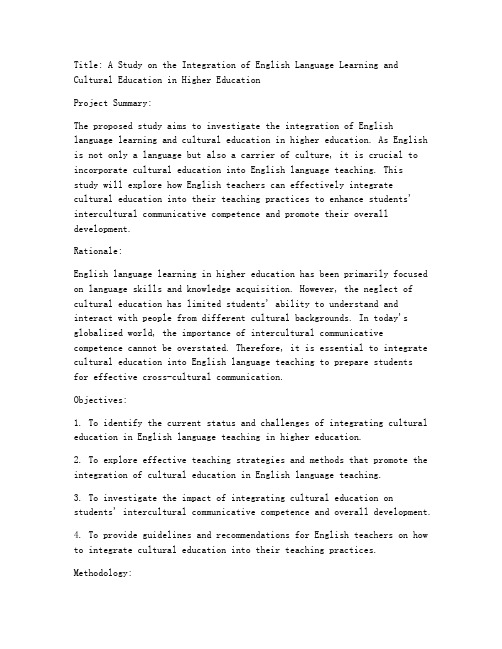
Title: A Study on the Integration of English Language Learning and Cultural Education in Higher EducationProject Summary:The proposed study aims to investigate the integration of English language learning and cultural education in higher education. As English is not only a language but also a carrier of culture, it is crucial to incorporate cultural education into English language teaching. This study will explore how English teachers can effectively integrate cultural education into their teaching practices to enhance students' intercultural communicative competence and promote their overall development.Rationale:English language learning in higher education has been primarily focused on language skills and knowledge acquisition. However, the neglect of cultural education has limited students' ability to understand and interact with people from different cultural backgrounds. In today's globalized world, the importance of intercultural communicative competence cannot be overstated. Therefore, it is essential to integrate cultural education into English language teaching to prepare studentsfor effective cross-cultural communication.Objectives:1. To identify the current status and challenges of integrating cultural education in English language teaching in higher education.2. To explore effective teaching strategies and methods that promote the integration of cultural education in English language teaching.3. To investigate the impact of integrating cultural education on students' intercultural communicative competence and overall development.4. To provide guidelines and recommendations for English teachers on how to integrate cultural education into their teaching practices.Methodology:The study will employ a mixed-methods approach, combining both qualitative and quantitative research methods. The sample populationwill consist of English teachers and students from various universities in China. Data collection methods will include surveys, interviews, and classroom observations. The collected data will be analyzed using statistical software and thematic analysis to draw meaningful conclusions.Expected Outcomes:1. A comprehensive understanding of the current status and challenges of integrating cultural education in English language teaching in higher education.2. A set of effective teaching strategies and methods that promote the integration of cultural education in English language teaching.3. Evidence of the impact of integrating cultural education on students' intercultural communicative competence and overall development.4. Recommendations for English teachers on how to integrate cultural education into their teaching practices.Significance:The findings of this study will contribute to the existing body of research on English language teaching and cultural education. It will provide valuable insights for English teachers on how to effectively integrate cultural education into their teaching practices, ultimately enhancing students' intercultural communicative competence and preparing them for success in the globalized world.Timeline:The proposed study will be conducted over a period of 18 months. Thefirst six months will be dedicated to literature review and methodology development. The next six months will be focused on data collection and analysis. The final three months will be spent on writing the research report and disseminating the findings.Budget:The total estimated budget for this project is RMB 80,000. The fundswill be primarily used for research expenses, including data collection, participant compensation, and travel expenses.In conclusion, the proposed study on the integration of English language learning and cultural education in higher education is of significant importance. By providing practical guidelines and recommendations for English teachers, this study will contribute to enhancing students' intercultural communicative competence and overall development. We hope to receive your support and approval for this project.Sincerely,[Your Name]。
英语学科立项申请书模板
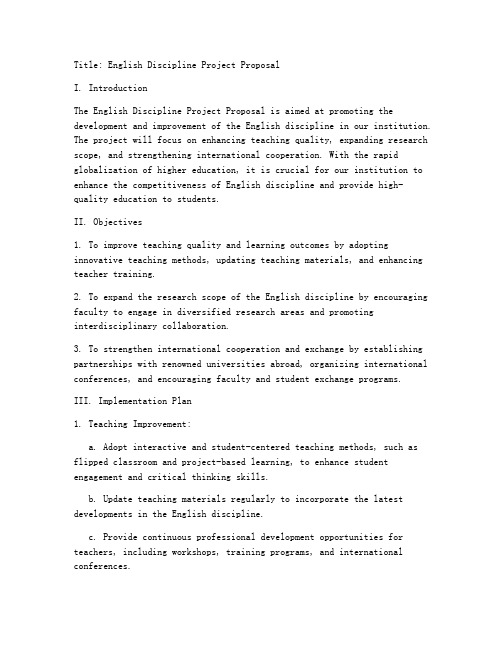
Title: English Discipline Project ProposalI. IntroductionThe English Discipline Project Proposal is aimed at promoting the development and improvement of the English discipline in our institution. The project will focus on enhancing teaching quality, expanding research scope, and strengthening international cooperation. With the rapid globalization of higher education, it is crucial for our institution to enhance the competitiveness of English discipline and provide high-quality education to students.II. Objectives1. To improve teaching quality and learning outcomes by adopting innovative teaching methods, updating teaching materials, and enhancing teacher training.2. To expand the research scope of the English discipline by encouraging faculty to engage in diversified research areas and promoting interdisciplinary collaboration.3. To strengthen international cooperation and exchange by establishing partnerships with renowned universities abroad, organizing international conferences, and encouraging faculty and student exchange programs.III. Implementation Plan1. Teaching Improvement:a. Adopt interactive and student-centered teaching methods, such as flipped classroom and project-based learning, to enhance student engagement and critical thinking skills.b. Update teaching materials regularly to incorporate the latest developments in the English discipline.c. Provide continuous professional development opportunities for teachers, including workshops, training programs, and international conferences.2. Research Enhancement:a. Encourage faculty to apply for national and provincial research projects, and provide necessary support and funding.b. Establish research centers and laboratories dedicated to the English discipline to facilitate faculty and student research activities.c. Promote interdisciplinary collaboration by organizing academic seminars, workshops, and conferences.3. International Cooperation:a. Establish partnerships with renowned universities in English-speaking countries to facilitate faculty and student exchange programs.b. Organize international conferences and workshops in collaboration with international academic organizations.c. Encourage faculty and students to participate in international exchange programs, conferences, and seminars to broaden their horizons and enhance their international competitiveness.IV. Expected Outcomes1. Improved teaching quality and learning outcomes, as evidenced by higher student satisfaction and better academic performance.2. Expanded research scope and increased research output, as evidencedby more publications, conferences, and partnerships with international institutions.3. Strengthened international cooperation and exchange, as evidenced by increased student and faculty exchange programs, joint research projects, and international conferences.V. Budget and FundingThe project requires a total budget of [amount] to cover teaching materials, teacher training, research funding, international cooperation activities, and other related expenses. We plan to apply for fundingfrom the institution's internal grant program, as well as seek externalfunding from government agencies, private enterprises, and international organizations.VI. ConclusionThe English Discipline Project Proposal aims to promote the development and improvement of the English discipline in our institution. By focusing on teaching improvement, research enhancement, andinternational cooperation, we expect to enhance the competitiveness of our English program, provide high-quality education to students, and contribute to the advancement of the English discipline. We hope to secure the support and approval of the institution's administration and faculty.[Your Name][Your Position][Your Institution]。
中学英语立项申请书模板
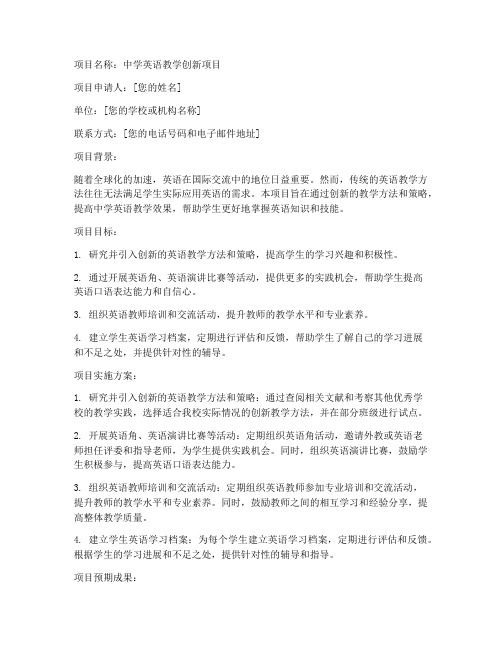
项目名称:中学英语教学创新项目项目申请人:[您的姓名]单位:[您的学校或机构名称]联系方式:[您的电话号码和电子邮件地址]项目背景:随着全球化的加速,英语在国际交流中的地位日益重要。
然而,传统的英语教学方法往往无法满足学生实际应用英语的需求。
本项目旨在通过创新的教学方法和策略,提高中学英语教学效果,帮助学生更好地掌握英语知识和技能。
项目目标:1. 研究并引入创新的英语教学方法和策略,提高学生的学习兴趣和积极性。
2. 通过开展英语角、英语演讲比赛等活动,提供更多的实践机会,帮助学生提高英语口语表达能力和自信心。
3. 组织英语教师培训和交流活动,提升教师的教学水平和专业素养。
4. 建立学生英语学习档案,定期进行评估和反馈,帮助学生了解自己的学习进展和不足之处,并提供针对性的辅导。
项目实施方案:1. 研究并引入创新的英语教学方法和策略:通过查阅相关文献和考察其他优秀学校的教学实践,选择适合我校实际情况的创新教学方法,并在部分班级进行试点。
2. 开展英语角、英语演讲比赛等活动:定期组织英语角活动,邀请外教或英语老师担任评委和指导老师,为学生提供实践机会。
同时,组织英语演讲比赛,鼓励学生积极参与,提高英语口语表达能力。
3. 组织英语教师培训和交流活动:定期组织英语教师参加专业培训和交流活动,提升教师的教学水平和专业素养。
同时,鼓励教师之间的相互学习和经验分享,提高整体教学质量。
4. 建立学生英语学习档案:为每个学生建立英语学习档案,定期进行评估和反馈。
根据学生的学习进展和不足之处,提供针对性的辅导和指导。
项目预期成果:1. 学生的英语学习成绩明显提高,学习兴趣和积极性得到提升。
2. 学生的英语口语表达能力和自信心得到提高,能够更好地适应国际化竞争环境。
3. 英语教师的教学水平和专业素养得到提升,能够更好地满足学生的发展需求。
4. 学生英语学习档案的建立和完善,为学生的个性化学习和辅导提供有力支持。
项目预算:1. 教学设备和材料的购置:5000元2. 教师培训和交流活动的费用:8000元3. 学生活动的组织和实施费用:6000元4. 项目管理和评估费用:4000元总计:23000元申请单位意见:[请填写申请单位对项目的意见和批准情况]申请人签名:日期:[请填写申请日期]。
课题立项申请书英语教学

课题立项申请书英语教学Research Proposal on English Language Teaching.Abstract:The purpose of this research proposal is to investigate the effectiveness of learner-centered approaches in improving English language proficiency among secondary school students. The proposal outlines the research design, methodology, data collection, and analysis methods to be employed in the study.Background:English language teaching has been a fundamental aspect of education globally, with various methodologies emerging to meet the diverse needs of learners. Traditional teacher-centered approaches have long been prevalent in second language instruction, prioritizing content delivery and teacher authority. However, recent research advocates forlearner-centered approaches that empower students and promote active engagement in the learning process.Research Questions:1. To what extent do learner-centered approaches enhance English language proficiency in terms of speaking, listening, reading, and writing?2. What are the specific aspects of learner-centered approaches that contribute to improved language proficiency?Methodology:The study will adopt a quantitative research design using a quasi-experimental method. Participants will be randomly assigned to two groups: an experimental group implementing learner-centered approaches and a controlgroup following a traditional teacher-centered approach.Data collection will involve:1. Preand post-tests to measure changes in English language proficiency using standardized language assessments.2. Classroom observations to document the implementation of learner-centered approaches and student engagement.3. Student surveys to gather feedback and insights into their experiences with the different methodologies.Data Analysis:1. Statistical analysis to compare the language proficiency scores between the experimental and control groups.2. Qualitative analysis of classroom observation data and student surveys to identify the specific aspects of learner-centered approaches that contribute to enhanced language proficiency.Significance:This research will provide valuable insights into the effectiveness of learner-centered approaches in improving English language proficiency among secondary school students. The findings will help educators refine their pedagogical practices, fostering a more learner-centric educational environment that empowers students to actively engage in their language learning journey.中文回答:课题立项申请书,英语教学。
课题立项申请书英语教学
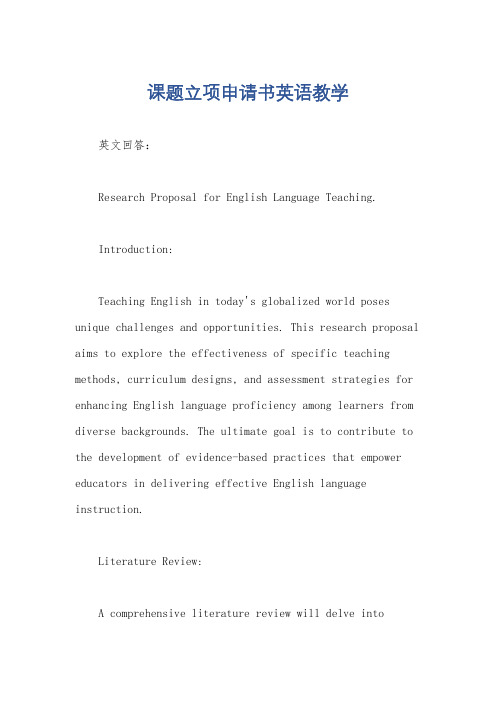
课题立项申请书英语教学英文回答:Research Proposal for English Language Teaching.Introduction:Teaching English in today's globalized world poses unique challenges and opportunities. This research proposal aims to explore the effectiveness of specific teaching methods, curriculum designs, and assessment strategies for enhancing English language proficiency among learners from diverse backgrounds. The ultimate goal is to contribute to the development of evidence-based practices that empower educators in delivering effective English language instruction.Literature Review:A comprehensive literature review will delve intoexisting research on the most effective approaches to English language teaching. This will include an examination of the cognitive, linguistic, and sociocultural factorsthat influence language acquisition. The review will also highlight the strengths and limitations of different teaching methods, from traditional grammar-translation to more interactive and communicative approaches.Research Questions:This research will investigate the following key questions:1. What teaching methods are most effective for developing learners' English language skills (reading, writing, speaking, and listening)?2. How can curriculum design be optimized to cater to the unique needs of learners from diverse linguistic and cultural backgrounds?3. What assessment strategies can accurately measurelearners' English language proficiency and provide meaningful feedback?Methodology:To answer these research questions, the study will employ a mixed-methods approach, combining bothquantitative and qualitative data collection techniques. This will include:1. Quantitative data collection: A quasi-experimental design will be used to compare the effectiveness of different teaching methods and curriculum designs. Learners will be randomly assigned to different treatment groups and their performance will be assessed using standardized language proficiency tests.2. Qualitative data collection: Observations, interviews, and focus groups will be conducted to gain insights into the experiences and perspectives of learners and teachers. This data will provide a deeper understanding of the processes involved in language acquisition and thefactors that influence learning outcomes.Expected Outcomes:This research aims to generate practical recommendations for English language teaching professionals. The expected outcomes include:1. Empirical evidence on the effectiveness of different teaching methods and curriculum designs.2. Insights into the best practices for catering to learners from diverse backgrounds.3. The development of assessment strategies that are valid, reliable, and provide actionable feedback.Significance:This research has significant implications for thefield of English language teaching. The findings will contribute to the advancement of knowledge about howlearners acquire English as a second or foreign language. By providing evidence-based recommendations, this research will empower educators to make informed decisions about their teaching practices, leading to improved learning outcomes for English language learners worldwide.中文回答:英语教学课题立项申请书。
大学英语立项申请书模板
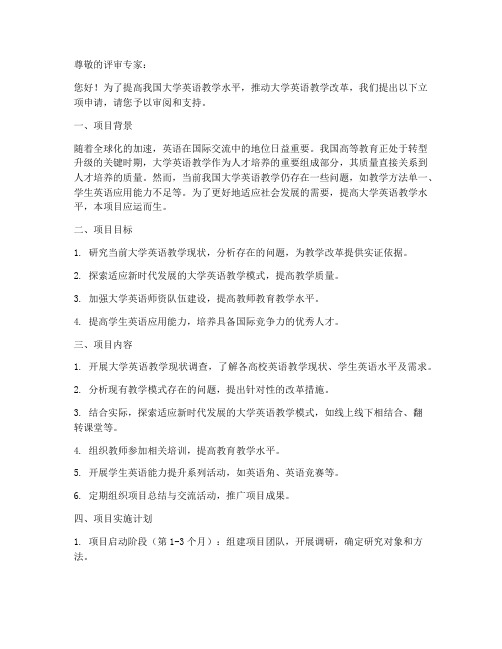
尊敬的评审专家:您好!为了提高我国大学英语教学水平,推动大学英语教学改革,我们提出以下立项申请,请您予以审阅和支持。
一、项目背景随着全球化的加速,英语在国际交流中的地位日益重要。
我国高等教育正处于转型升级的关键时期,大学英语教学作为人才培养的重要组成部分,其质量直接关系到人才培养的质量。
然而,当前我国大学英语教学仍存在一些问题,如教学方法单一、学生英语应用能力不足等。
为了更好地适应社会发展的需要,提高大学英语教学水平,本项目应运而生。
二、项目目标1. 研究当前大学英语教学现状,分析存在的问题,为教学改革提供实证依据。
2. 探索适应新时代发展的大学英语教学模式,提高教学质量。
3. 加强大学英语师资队伍建设,提高教师教育教学水平。
4. 提高学生英语应用能力,培养具备国际竞争力的优秀人才。
三、项目内容1. 开展大学英语教学现状调查,了解各高校英语教学现状、学生英语水平及需求。
2. 分析现有教学模式存在的问题,提出针对性的改革措施。
3. 结合实际,探索适应新时代发展的大学英语教学模式,如线上线下相结合、翻转课堂等。
4. 组织教师参加相关培训,提高教育教学水平。
5. 开展学生英语能力提升系列活动,如英语角、英语竞赛等。
6. 定期组织项目总结与交流活动,推广项目成果。
四、项目实施计划1. 项目启动阶段(第1-3个月):组建项目团队,开展调研,确定研究对象和方法。
2. 项目实施阶段(第4-8个月):开展教学现状调查,分析问题,探索教学模式,组织教师培训。
3. 项目推进阶段(第9-12个月):推广项目成果,开展学生英语能力提升活动,总结项目经验。
4. 项目总结阶段(第13-15个月):撰写项目总结报告,提交成果,进行项目评估。
五、项目预期成果1. 形成一套科学的大学英语教学现状分析报告。
2. 提出一套适应新时代发展的大学英语教学模式。
3. 提高一批大学英语教师的教育教学水平。
4. 提升学生的英语应用能力,培养更多具备国际竞争力的优秀人才。
英语课题立项申请书模板
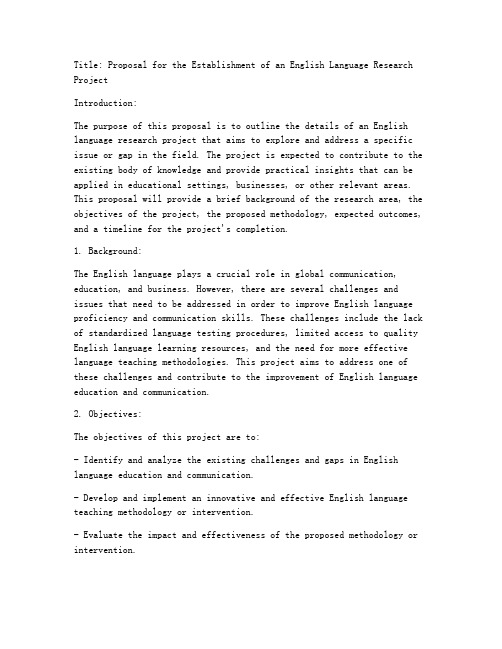
Title: Proposal for the Establishment of an English Language Research ProjectIntroduction:The purpose of this proposal is to outline the details of an English language research project that aims to explore and address a specific issue or gap in the field. The project is expected to contribute to the existing body of knowledge and provide practical insights that can be applied in educational settings, businesses, or other relevant areas. This proposal will provide a brief background of the research area, the objectives of the project, the proposed methodology, expected outcomes, and a timeline for the project's completion.1. Background:The English language plays a crucial role in global communication, education, and business. However, there are several challenges and issues that need to be addressed in order to improve English language proficiency and communication skills. These challenges include the lack of standardized language testing procedures, limited access to quality English language learning resources, and the need for more effective language teaching methodologies. This project aims to address one of these challenges and contribute to the improvement of English language education and communication.2. Objectives:The objectives of this project are to:- Identify and analyze the existing challenges and gaps in English language education and communication.- Develop and implement an innovative and effective English language teaching methodology or intervention.- Evaluate the impact and effectiveness of the proposed methodology or intervention.- Disseminate the findings of the project to relevant stakeholders and contribute to the existing body of knowledge.3. Proposed Methodology:The proposed methodology for this project will involve several steps, including:- Conducting a thorough literature review to identify the existing challenges and gaps in English language education and communication.- Developing and implementing an innovative and effective English language teaching methodology or intervention, based on the findings of the literature review.- Conducting empirical research to evaluate the impact and effectiveness of the proposed methodology or intervention.- Analyzing and interpreting the data collected during the research phase.- Disseminating the findings of the project through research papers, presentations, or other relevant means.4. Expected Outcomes:The expected outcomes of this project include:- A comprehensive understanding of the existing challenges and gaps in English language education and communication.- The development and implementation of an innovative and effective English language teaching methodology or intervention.- Empirical evidence on the impact and effectiveness of the proposed methodology or intervention.- A contribution to the existing body of knowledge in the field of English language education and communication.- Enhanced English language proficiency and communication skills among the target population.5. Timeline:The proposed timeline for the completion of this project is as follows:- Month 1-3: Conducting a thorough literature review and identifying the existing challenges and gaps in English language education and communication.- Month 4-6: Developing and implementing an innovative and effective English language teaching methodology or intervention.- Month 7-9: Conducting empirical research to evaluate the impact and effectiveness of the proposed methodology or intervention.- Month 10-12: Analyzing and interpreting the data collected during the research phase, and preparing research papers or presentations for dissemination.Conclusion:In conclusion, this project aims to contribute to the improvement of English language education and communication by addressing a specific challenge or gap in the field. The proposed methodology and timelinewill ensure the effective implementation and evaluation of the project, leading to meaningful outcomes that can be disseminated to relevant stakeholders. The successful completion of this project will provide valuable insights and practical solutions that can be applied in educational settings, businesses, or other relevant areas.。
英语课题立项申请书经典模板
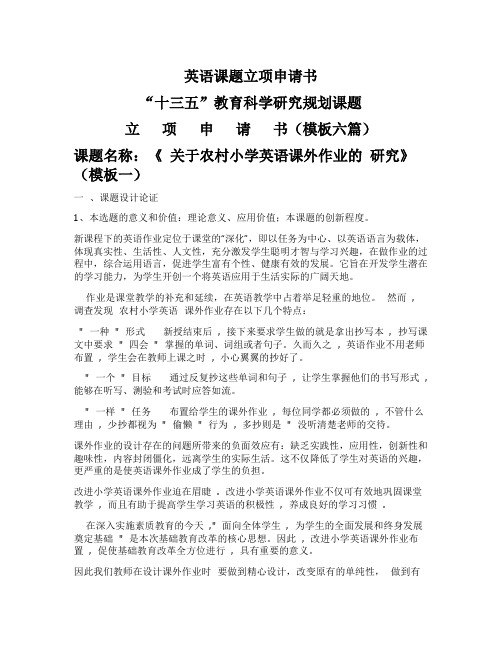
英语课题立项申请书“十三五”教育科学研究规划课题立项申请书(模板六篇)课题名称:《关于农村小学英语课外作业的研究》(模板一)一、课题设计论证1、本选题的意义和价值:理论意义、应用价值;本课题的创新程度。
新课程下的英语作业定位于课堂的“深化”,即以任务为中心、以英语语言为载体,体现真实性、生活性、人文性,充分激发学生聪明才智与学习兴趣,在做作业的过程中,综合运用语言,促进学生富有个性、健康有效的发展。
它旨在开发学生潜在的学习能力,为学生开创一个将英语应用于生活实际的广阔天地。
作业是课堂教学的补充和延续,在英语教学中占着举足轻重的地位。
然而,调查发现农村小学英语课外作业存在以下几个特点:" 一种" 形式新授结束后, 接下来要求学生做的就是拿出抄写本, 抄写课文中要求" 四会" 掌握的单词、词组或者句子。
久而久之, 英语作业不用老师布置, 学生会在教师上课之时, 小心翼翼的抄好了。
" 一个" 目标通过反复抄这些单词和句子, 让学生掌握他们的书写形式, 能够在听写、测验和考试时应答如流。
" 一样" 任务布置给学生的课外作业, 每位同学都必须做的, 不管什么理由, 少抄都视为" 偷懒" 行为, 多抄则是" 没听清楚老师的交待。
课外作业的设计存在的问题所带来的负面效应有:缺乏实践性,应用性,创新性和趣味性,内容封闭僵化,远离学生的实际生活。
这不仅降低了学生对英语的兴趣,更严重的是使英语课外作业成了学生的负担。
改进小学英语课外作业迫在眉睫. 改进小学英语课外作业不仅可有效地巩固课堂教学, 而且有助于提高学生学习英语的积极性, 养成良好的学习习惯.在深入实施素质教育的今天," 面向全体学生, 为学生的全面发展和终身发展奠定基础" 是本次基础教育改革的核心思想。
因此, 改进小学英语课外作业布置, 促使基础教育改革全方位进行, 具有重要的意义。
高中英语课题立项申请书
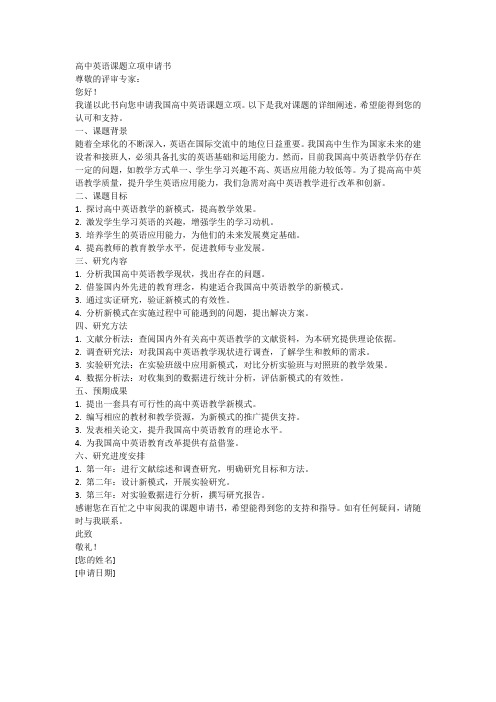
高中英语课题立项申请书尊敬的评审专家:您好!我谨以此书向您申请我国高中英语课题立项。
以下是我对课题的详细阐述,希望能得到您的认可和支持。
一、课题背景随着全球化的不断深入,英语在国际交流中的地位日益重要。
我国高中生作为国家未来的建设者和接班人,必须具备扎实的英语基础和运用能力。
然而,目前我国高中英语教学仍存在一定的问题,如教学方式单一、学生学习兴趣不高、英语应用能力较低等。
为了提高高中英语教学质量,提升学生英语应用能力,我们急需对高中英语教学进行改革和创新。
二、课题目标1. 探讨高中英语教学的新模式,提高教学效果。
2. 激发学生学习英语的兴趣,增强学生的学习动机。
3. 培养学生的英语应用能力,为他们的未来发展奠定基础。
4. 提高教师的教育教学水平,促进教师专业发展。
三、研究内容1. 分析我国高中英语教学现状,找出存在的问题。
2. 借鉴国内外先进的教育理念,构建适合我国高中英语教学的新模式。
3. 通过实证研究,验证新模式的有效性。
4. 分析新模式在实施过程中可能遇到的问题,提出解决方案。
四、研究方法1. 文献分析法:查阅国内外有关高中英语教学的文献资料,为本研究提供理论依据。
2. 调查研究法:对我国高中英语教学现状进行调查,了解学生和教师的需求。
3. 实验研究法:在实验班级中应用新模式,对比分析实验班与对照班的教学效果。
4. 数据分析法:对收集到的数据进行统计分析,评估新模式的有效性。
五、预期成果1. 提出一套具有可行性的高中英语教学新模式。
2. 编写相应的教材和教学资源,为新模式的推广提供支持。
3. 发表相关论文,提升我国高中英语教育的理论水平。
4. 为我国高中英语教育改革提供有益借鉴。
六、研究进度安排1. 第一年:进行文献综述和调查研究,明确研究目标和方法。
2. 第二年:设计新模式,开展实验研究。
3. 第三年:对实验数据进行分析,撰写研究报告。
感谢您在百忙之中审阅我的课题申请书,希望能得到您的支持和指导。
英语课题立项申请书范文
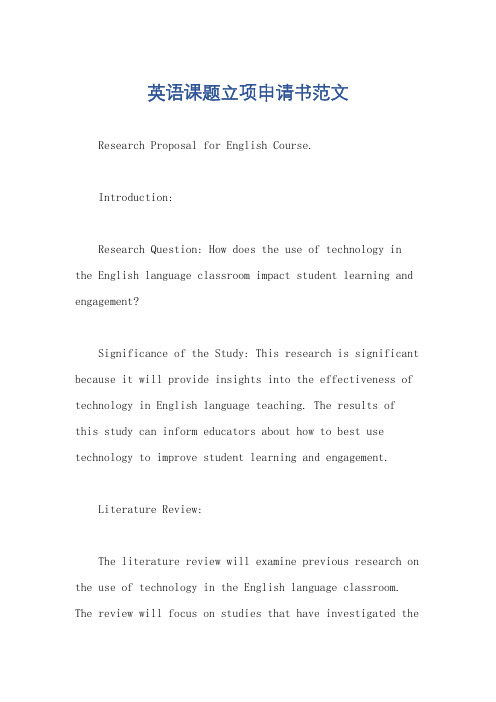
英语课题立项申请书范文Research Proposal for English Course.Introduction:Research Question: How does the use of technology in the English language classroom impact student learning and engagement?Significance of the Study: This research is significant because it will provide insights into the effectiveness of technology in English language teaching. The results ofthis study can inform educators about how to best use technology to improve student learning and engagement.Literature Review:The literature review will examine previous research on the use of technology in the English language classroom. The review will focus on studies that have investigated theimpact of technology on student learning, engagement, and motivation.Methodology:The research will use a mixed-methods approach. Quantitative data will be collected through surveys and questionnaires. Qualitative data will be collected through interviews and observations.Data Analysis:The quantitative data will be analyzed usingstatistical software. The qualitative data will be analyzed using thematic analysis.Expected Outcomes:The expected outcomes of this research are:1. A better understanding of the impact of technology on student learning and engagement in the English languageclassroom.2. Recommendations for how to best use technology inthe English language classroom.Timeline:The research will be conducted over a period of one year. The research will be completed by the end of May 2024.Budget:The budget for this research is $5,000. The budget will be used to cover the costs of data collection, data analysis, and dissemination of results.References:[1] Egbert, J., & Petrie, H. (2013). Technology in the language classroom: A literature review. Language Teaching Research, 17(2), 193-215.[2] Warschauer, M., & Matuchniak, T. (2010). New technologies and second language learning. Annual Review of Applied Linguistics, 30, 24-45.中文回答:研究课题申请书。
关于小学英语作业设计课题立项申请书
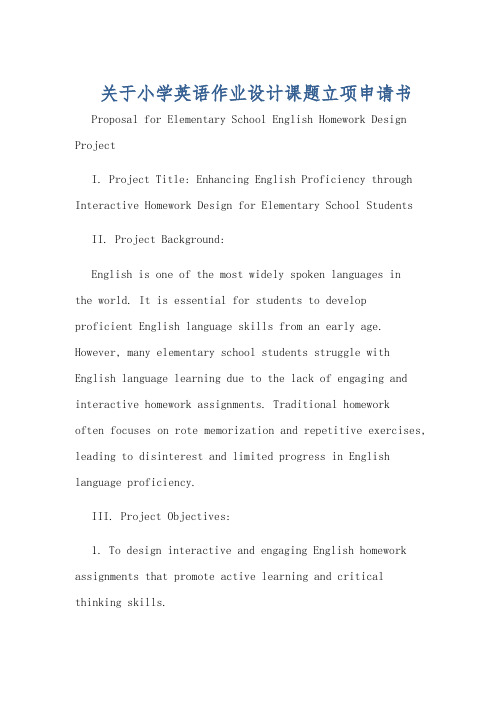
关于小学英语作业设计课题立项申请书Proposal for Elementary School English Homework Design ProjectI. Project Title: Enhancing English Proficiency through Interactive Homework Design for Elementary School Students II. Project Background:English is one of the most widely spoken languages inthe world. It is essential for students to developproficient English language skills from an early age. However, many elementary school students struggle with English language learning due to the lack of engaging and interactive homework assignments. Traditional homeworkoften focuses on rote memorization and repetitive exercises, leading to disinterest and limited progress in English language proficiency.III. Project Objectives:1. To design interactive and engaging English homework assignments that promote active learning and critical thinking skills.2. To enhance students' English language proficiency through the use of creative and interactive homework activities.3. To promote a positive attitude towards English language learning among elementary school students.IV. Project Design and Methodology:The project will involve the following key activities:1. Research and Analysis: Conducting a thorough reviewof current English homework assignments and identifying areas for improvement.2. Curriculum Alignment: Aligning the homework designwith the school's English language curriculum to ensure relevance and effectiveness.3. Interactive Activities: Designing a variety of interactive and engaging homework activities, such as games, role-plays, and creative writing tasks.4. Pilot Testing: Implementing the newly designed homework assignments with a small group of students to gather feedback and make necessary adjustments.5. Evaluation: Assessing the impact of the new homework design on students' English language proficiency andlearning outcomes.V. Expected Outcomes:1. Improved English Language Proficiency: Students will demonstrate increased proficiency in English languageskills, including reading, writing, listening, and speaking.2. Positive Attitude: Students will exhibit a more positive attitude towards English language learning,leading to higher motivation and engagement in the classroom.3. Enhanced Learning Experience: The new homework design will provide students with a more enjoyable and effective learning experience, contributing to their overall academic success.VI. Project Timeline:The project will be implemented over a period of 12 months, starting from September 2022 to August 2023. The timeline will include research and analysis, curriculumalignment, homework design, pilot testing, and evaluation phases.VII. Budget and Resources:The project will require funding for research materials, software for interactive activities, and training for teachers in implementing the new homework design. Additionally, the project will utilize existing school resources and facilities for pilot testing and evaluation.VIII. Conclusion:This project aims to address the current challenges in English language homework assignments for elementary school students. By designing interactive and engaging homework activities, we seek to enhance students' English language proficiency and promote a positive attitude towards language learning. We believe that this project will contribute to the overall academic success of students and provide a model for effective English language homework design in elementary schools.中文翻译:I. 项目标题:通过互动作业设计提高小学生英语水平II. 项目背景:英语是世界上使用最广泛的语言之一。
英语词汇教校本课题立项申请书
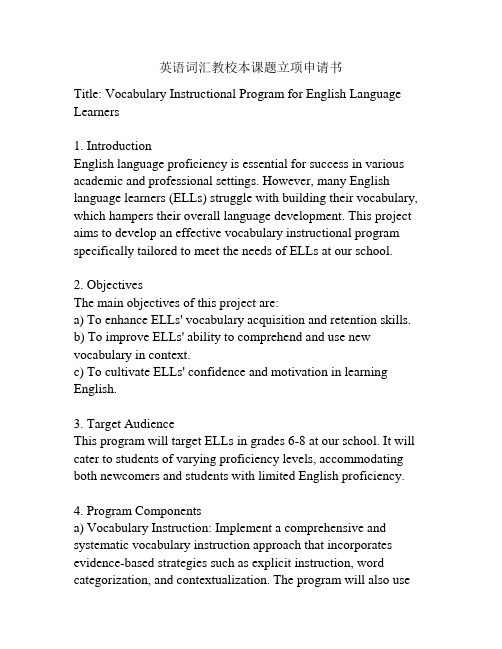
英语词汇教校本课题立项申请书Title: Vocabulary Instructional Program for English Language Learners1. IntroductionEnglish language proficiency is essential for success in various academic and professional settings. However, many English language learners (ELLs) struggle with building their vocabulary, which hampers their overall language development. This project aims to develop an effective vocabulary instructional program specifically tailored to meet the needs of ELLs at our school.2. ObjectivesThe main objectives of this project are:a) To enhance ELLs' vocabulary acquisition and retention skills.b) To improve ELLs' ability to comprehend and use new vocabulary in context.c) To cultivate ELLs' confidence and motivation in learning English.3. Target AudienceThis program will target ELLs in grades 6-8 at our school. It will cater to students of varying proficiency levels, accommodating both newcomers and students with limited English proficiency.4. Program Componentsa) Vocabulary Instruction: Implement a comprehensive and systematic vocabulary instruction approach that incorporates evidence-based strategies such as explicit instruction, word categorization, and contextualization. The program will also usemultimedia resources and technology to engage and reinforce vocabulary learning.b) Vocabulary Practice: Provide regular opportunities for students to practice and apply newly acquired vocabulary through interactive exercises, games, and real-life contexts.c) Vocabulary Assessment: Develop formative and summative assessments to measure students' vocabulary growth and progress accurately.5. TimelineThe proposed timeline for this project is as follows:a) Program Development: Months 1-3b) Pilot Testing and Evaluation: Months 4-6c) Program Refinement: Months 7-8d) Full Implementation: Months 9-126. Evaluation PlanTo ensure the effectiveness of the program, the following evaluation methods will be employed:a) Pre and post-assessments to measure growth in vocabulary knowledge.b) Regular formative assessments to monitor individual student progress.c) Student and teacher feedback surveys to identify areas for improvement.7. Resources RequiredThe successful implementation of this project will require the following resources:a) Development and procurement of instructional materials andresources.b) Training and professional development for teachers to deliver the program effectively.c) Access to technology and multimedia resources.d) Evaluation tools and data collection instruments.8. BudgetAn estimated budget breakdown for this project is as follows:- Instructional materials and resources: $X- Teacher training and professional development: $X- Technology and multimedia resources: $X- Evaluation tools and data collection instruments: $X- Contingency: $X9. ConclusionBy implementing an effective vocabulary instructional program for ELLs, we aim to empower our students with the necessary language skills to succeed academically and socially. This project will foster a supportive learning environment, enabling ELLs to build their vocabulary, improve English language proficiency, and ultimately achieve long-term success.。
小学英语课题申报立项书范文

小学英语课题申报立项书范文As a document creator, I am now playing the role of a primary school English lesson project proposer. Below is the sample text for the English project proposal:Introduction:English education is an essential part of primary school curriculum, as it helps students develop language skills, communication abilities, and cultural awareness. In order to enhance the quality of English teaching and learning in our school, I propose a new English lesson project that aims to engage students in interactive and immersive language activities.Project Objectives:1. To improve students' English language proficiency through fun and engaging activities.2. To enhance students' communication skills by providing opportunities for speaking and listening practice.3. To foster students' interest in English language and culture through interactive lessons and games.4. To create a supportive and inclusive learning environment where all students feel motivated and encouraged to participate.Project Activities:1. Interactive Language Games: Incorporate language games such as word puzzles, charades, and role-playing activities to make learning English fun and engaging.2. Storytelling Sessions: Encourage students to share their own stories or read English storybooks aloud to practice speaking and listening skills.3. Cultural Exchange Activities: Organize cultural exchange events where students can learn about different English-speaking countries and their traditions.4. Language Workshops: Invite guest speakers or language experts to conduct workshops on specific language topics or skills.Project Implementation:The project will be implemented in collaboration with English teachers, school administrators, and parent volunteers. Regular meetings will be held to discuss lesson plans, assess student progress, and address any challenges that may arise. Feedback from students, teachers, and parents will be collected to evaluate the effectiveness of the project and make necessary adjustments.Project Evaluation:At the end of the project, a comprehensive evaluation will be conducted to assess the impact of the new English lesson project on students' language proficiency, communication skills, and overall interest in learning English. Results will be shared with school stakeholders to inform future English teaching strategies and initiatives.Conclusion:In conclusion, the proposed English lesson project aims to create a dynamic and engaging learning environment for students to improve their English language skills and cultural awareness. By implementing interactive activities, fostering communication skills, and promoting a love for the English language, we hope to inspire students to become lifelong learners and global citizens. Thank you for considering this project proposal.。
英语课题立项申报书范文

英语课题立项申报书范文Here's a sample of an English project proposal draft that follows the given instructions:Proposal Overview.Hey, guys! I've been thinking about this English language project for quite some time. Basically, we're gonna explore the role of slang and dialects in modern English communication. Like, how do they shape our understanding of the language and culture?Research Focus.You know, English is such a global language, but it's not just one single language. There are so many variations, from Aussie slang to British accents. We'll be delving into that, seeing how these differences affect how we perceive each other.Methodology.For this, we'll be conducting interviews, analyzing videos, and even maybe doing some fieldwork. Like, going to different places where English is spoken and hearing how people talk. It's gonna be awesome!Expected Outcomes.Hopefully, we'll be able to gain a deeper understanding of how language is used in real-world situations. Maybewe'll even find some interesting patterns or trends. Who knows? This could be a really cool project!Practical Applications.This research isn't just theoretical. It could actually help us improve our communication skills. Like, understanding different dialects.。
英语课题立项范文
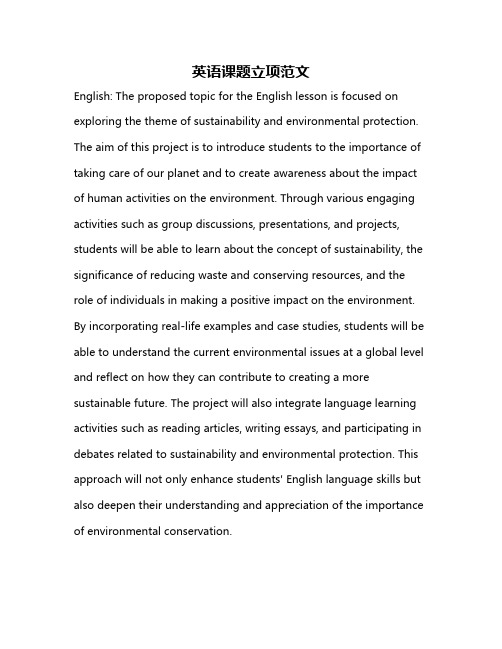
英语课题立项范文English: The proposed topic for the English lesson is focused on exploring the theme of sustainability and environmental protection. The aim of this project is to introduce students to the importance of taking care of our planet and to create awareness about the impact of human activities on the environment. Through various engaging activities such as group discussions, presentations, and projects, students will be able to learn about the concept of sustainability, the significance of reducing waste and conserving resources, and the role of individuals in making a positive impact on the environment. By incorporating real-life examples and case studies, students will be able to understand the current environmental issues at a global level and reflect on how they can contribute to creating a more sustainable future. The project will also integrate language learning activities such as reading articles, writing essays, and participating in debates related to sustainability and environmental protection. This approach will not only enhance students' English language skills but also deepen their understanding and appreciation of the importance of environmental conservation.中文翻译: 提议的英语课题专注于探讨可持续性和环境保护主题。
教师英语课题立项申请书
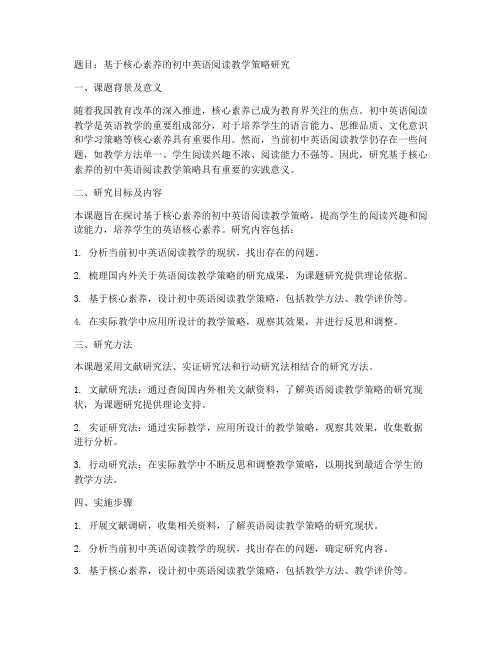
题目:基于核心素养的初中英语阅读教学策略研究一、课题背景及意义随着我国教育改革的深入推进,核心素养已成为教育界关注的焦点。
初中英语阅读教学是英语教学的重要组成部分,对于培养学生的语言能力、思维品质、文化意识和学习策略等核心素养具有重要作用。
然而,当前初中英语阅读教学仍存在一些问题,如教学方法单一、学生阅读兴趣不浓、阅读能力不强等。
因此,研究基于核心素养的初中英语阅读教学策略具有重要的实践意义。
二、研究目标及内容本课题旨在探讨基于核心素养的初中英语阅读教学策略,提高学生的阅读兴趣和阅读能力,培养学生的英语核心素养。
研究内容包括:1. 分析当前初中英语阅读教学的现状,找出存在的问题。
2. 梳理国内外关于英语阅读教学策略的研究成果,为课题研究提供理论依据。
3. 基于核心素养,设计初中英语阅读教学策略,包括教学方法、教学评价等。
4. 在实际教学中应用所设计的教学策略,观察其效果,并进行反思和调整。
三、研究方法本课题采用文献研究法、实证研究法和行动研究法相结合的研究方法。
1. 文献研究法:通过查阅国内外相关文献资料,了解英语阅读教学策略的研究现状,为课题研究提供理论支持。
2. 实证研究法:通过实际教学,应用所设计的教学策略,观察其效果,收集数据进行分析。
3. 行动研究法:在实际教学中不断反思和调整教学策略,以期找到最适合学生的教学方法。
四、实施步骤1. 开展文献调研,收集相关资料,了解英语阅读教学策略的研究现状。
2. 分析当前初中英语阅读教学的现状,找出存在的问题,确定研究内容。
3. 基于核心素养,设计初中英语阅读教学策略,包括教学方法、教学评价等。
4. 在实际教学中应用所设计的教学策略,观察其效果,并进行反思和调整。
5. 总结研究成果,撰写课题研究报告。
五、预期成果通过本课题的研究,预期达到以下成果:1. 分析当前初中英语阅读教学的现状,找出存在的问题,为后续教学改革提供依据。
2. 基于核心素养,设计出适合初中英语阅读教学的有效策略,提高学生的阅读兴趣和阅读能力。
英语课题立项申请报告

英语课题立项申请报告Dear [Name of supervisor],I am writing to request approval for a research project proposal on an English language topic. The aim of this project is to investigate the impact of teaching strategies on students' language proficiency and speaking skills in middle school.Background:English proficiency plays a significant role in our world today. It is a fundamental tool for communication, global employment opportunities, and academic success. It is crucial, therefore, to explore effective teaching strategies that can enhance the language proficiency and speaking skills of students.Research Questions:1. How do different teaching strategies affect students' language proficiency in English?2. What impact do these teaching strategies have on students' speaking skills?3. Which teaching strategies are most effective in improving students' language proficiency and speaking skills? Objectives:1. To review current literature on effective teaching strategies for teaching English as a second language.2. To design and implement a comparative study to investigate the impact of different teaching strategies on language proficiency and speaking skills.3. To analyze the data collected and draw conclusions regardingthe most effective teaching strategies for improving language proficiency and speaking skills.Methodology:1. Literature Review: Conduct a comprehensive review of existing research papers, articles, and books related to teaching strategies in English language education.2. Data Collection: Select a sample of middle school students and divide them into groups. Each group will be taught using a different teaching strategy, such as direct instruction, cooperative learning, or task-based learning. Assessments such as standardized tests and speaking tasks will be used to measure language proficiency and speaking skills before and after the intervention.3. Data Analysis: Analyze the collected data using statistical methods to determine the impact of each teaching strategy on students' language proficiency and speaking skills.4. Conclusion: Summarize the findings and draw conclusions regarding the most effective teaching strategies for improving language proficiency and speaking skills.Anticipated Outcomes:By the completion of this project, it is anticipated that we will gain a deeper understanding of the effectiveness of various teaching strategies in enhancing students' language proficiency and speaking skills. This research will contribute to the existing literature on language education and provide guidance to educators in selecting appropriate teaching strategies.Timeline:- Literature Review: 2 months- Data Collection: 3 months- Data Analysis: 1 month- Report Writing: 1 monthBudget:The anticipated budget for this research project includes expenses related to data collection and analysis, participant incentives, and research materials. A detailed budget proposal will be submitted upon approval of the project.I believe that this research project will bring valuable insights and contribute to the improvement of English language education in middle schools. I kindly request your approval and support to proceed with this proposed project.Thank you for considering my application. I am available for further discussion or clarification if needed.Sincerely,[Your Name]。
- 1、下载文档前请自行甄别文档内容的完整性,平台不提供额外的编辑、内容补充、找答案等附加服务。
- 2、"仅部分预览"的文档,不可在线预览部分如存在完整性等问题,可反馈申请退款(可完整预览的文档不适用该条件!)。
- 3、如文档侵犯您的权益,请联系客服反馈,我们会尽快为您处理(人工客服工作时间:9:00-18:30)。
黑龙江省教育学会
“十三五”教育科学研究规划课题立项申请书课题编号
课题类别
研究领域
课题负责人
申请单位
通讯地址
邮政编码
申请日期
起止年月
说明
一、本申请书所列各项内容均需实事求是,认真填写。
对于课题研究的目的、意义、内容和方法等项目,填写要突出重点、明确严谨、简明扼要。
对课题的预期成果要贴切,体现价值。
二、上报的《课题立项申请书》一式3份,用作省、市教育学会和课题组存档。
三、每项课题负责人不得超过3位,每位负责人限申报一项课题。
每项课题参研人员不得超过30人。
四、此表必须由课题依托学校(专业委员会)负责人签章,并加盖学校(专业委员会)公章。
五、课题研究时限以批准日期为准,研究过程不能低于两年,一般不超过5年。
六、重点课题负责人,一般中学应具有高级专业技术职称、小学应具有中级以上专业技术职称、县(市、区)教育领域的学科带头人及各级教
育部门有多年教育行政、业务管理经验的干部。
特殊情况的负责人要在单位审批意见中加以说明。
一、课题研究人员
二、课题设计论证
三、课题负责人近5年取得的与本课题有关的主要研究成果
四、课题所在单位意见
五、市教育学会意见
六、省教育学会学术委员会评审意见。
